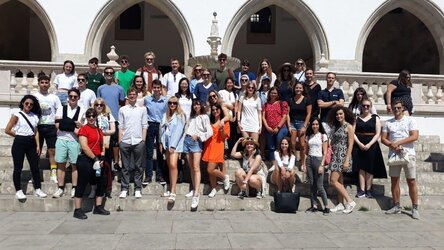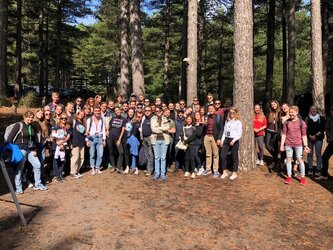Selection Criteria & How to Apply
Selection criteria
Places in the summer course are limited. In 2024, the ECSL plans to admit a maximum of 45 student applicants and 5 young professionals. We inevitably receive many more applications than there are places. In view of this, the ECSL applies the following criteria in the selection of candidates:
Student applicants (max. 45)
1. Applicants must be enrolled in undergraduate or graduate (but not PhD) courses in law, political science (e.g. international law & organisations), economics (space sector focus) or other disciplines related to space law and policy. Applications from students with a technical background who can demonstrate an interest in space law and policy are also welcome, and a few are selected each year. Generally however ESA has a dedicated "introduction to space law" course for students with a scientific, technical and engineering background - more information can be found here.
2. For applicants with a legal background, a sound knowledge of public international law and private international law, European Law, as well as some knowledge of space law basics are an advantage. For applicants without that a legal background, the application should show a high level of academic achievement in their field. You should be able to demonstrate an interest in the regulatory and policy side of space activities.
3. Fluency in spoken and written English.
4. Proven ability to work in a group.
5. Age: In case of a high number of applicants, students over the age of 27 years may be considered on a non-priority basis.
6. Geographical distribution:
(i) max. 6 Students per ESA Member State, Associate Members or Cooperating States;
(ii) max. 5 students per law faculty;
(iii) up to 5 students from non-ESA Member States, Associate Members or Cooperating States (on a non-priority basis); and
(iv) students admitted subject to the approval of the host university and the availability of funds.
7. Recommendation and ranking of the applicant’s National Point of Contact (NPOC) or, where students are applying from a State where no NPOC has been established, a supporting letter/reference from the student’s Faculty. (see below on ‘How to apply’ for more details)
The course fee for students is 200 EUR. See more about the course fee by clicking here.
Young professional applicants (max. 5)
The ECSL welcomes applications from young professionals citizens of or residing in ESA Member States, Associate Members or Cooperating States with a demonstrable interest in space law and policy and a strong academic background. There are no fixed criteria concerning the particular professional background of individual applicants and each application will be considered on its merits.
For the purposes of the ECSL Summer Course applications, young professional are considered to be individuals under the age of 35 who have completed a graduate study and are currently junior working professionals, or are completing a PhD.
The course fee for young professionals is 600 EUR. See more about the course fee by clicking here.
How to apply

All applicants, student and young professional, should follow the procedure outlined below:
Applicants should apply through the ECSL National Points of Contact (NPOC) listed here.
All applicants will be assessed solely on the basis of the information contained in the application form and CV. Since 2024, the application form is digital: please see the link here.
Please fill out the application form, download/save a copy of your responses and provide those to the relevant NPOC as outlined below. Applicants should therefore address the relevant application criteria above as far as possible in those documents.
(i) The applicant should apply through their National Point of Contact (corresponding to their state of residence/study);
(ii) If there is no NPOC in the applicants’ state of residence/study, then the applicant should contact the NPOC of their nationality;
(iii) In the event that the ECSL has not established a National Point of Contact in either the applicants’ state of residence/study OR state of nationality, the applicant should consider that filling out the application form (including the attachment of CV & supporting documents) is sufficient for their application.
If you have any questions about which NPOC to address please contact ecsl@esa.int.
Please note, applications which are not received in accordance with this procedure will not be considered.















 Germany
Germany
 Austria
Austria
 Belgium
Belgium
 Denmark
Denmark
 Spain
Spain
 Estonia
Estonia
 Finland
Finland
 France
France
 Greece
Greece
 Hungary
Hungary
 Ireland
Ireland
 Italy
Italy
 Luxembourg
Luxembourg
 Norway
Norway
 The Netherlands
The Netherlands
 Poland
Poland
 Portugal
Portugal
 Czechia
Czechia
 Romania
Romania
 United Kingdom
United Kingdom
 Slovenia
Slovenia
 Sweden
Sweden
 Switzerland
Switzerland


































